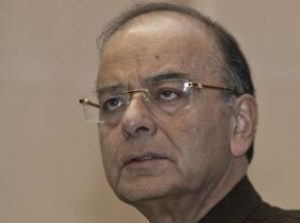
The resolution of the vexed issue of massive non-performing assets (NPAs) in the banking system is a work in progress and some “visible action” will be initiated over the next few days under the NPA ordinance promulgated recently, finance and defence minister Arun Jaitley said on Thursday.
“The RBI was taking measures under the existing mechanism. We have now taken other steps and there would be visible action taken under the new mechanism in the next few days,” Jaitley said, addressing media on achievements of the ministries under him over the past three years. The Centre won’t provide any special package to any state to waive farm loans but the states are free to spend from their own budgets should they take any such decision, the minister said.
Here are few excerpts from FM’s media briefing:
On NPAs and other things constraining private investments
Massive toxic assets impact the ability of banks to support growth, although record levels of foreign direct investments (gross FDI inflows touched $60 billion in 2016-17) and higher government spending have offset inadequate private investments to a certain extent. Linked to it (NPAs) is the challenge of wanting to increase private sector investment, even though our FDI and public investments have significantly increased. And of course there is a significant (adverse) impact of the global situation also (on private investments).
“Note ban not sole reason for Q4 GDP slowdown”
Demonetisation could be one of the several factors, and not the sole reason, that contributed to the slowdown of GDP growth to an 8 quarter-low of 6.1% in Q42016-17. What you think is very clear (that note ban dragged down Q4 growth) isn’t very clear. There are several factors which can contribute to GDP in a particular quarter. There was some slowdown visible, given the global and domestic situations, even prior to demonetisation in the last year. Financial services, which used to have 9-10% growth, has come down (to 2.2% in Q42016-17). Under the current global situation, 7-8% growth, which is at the moment the Indian normal, is fairly reasonable by our own standard and very good by global standards.
And I am sure as the impact of all these policies (taken by the government) holds out, growth will gather momentum. There won’t be any adverse impact of GST on GDP growth. The GST by itself should normally add to growth.
(Chief economic adviser Arvind Subramanian pointed out that under the GST, the incidence of tax is going to come down. While there could be some teething problem in implementation, at the most, initially, the tax cut would be positive to both reduce inflation and stimulate consumption).
On Pradhan Mantri Garib Kalyan Yojana
PMGKY wasn’t an isolated scheme in last financial year. First we introduced the Income Disclosure Scheme; after the IDS, there was a (post-demonetisation) phase of people depositing cash in the banking system. And the PMGKY was over and above these. To assess the total amount of (black money) disclosures made, you have to look at all the three collectively.
Revenue secretary Hasmukh Adhia said the response to PMGKY hasn’t been very good; only Rs 5,000 crore has been declared under the scheme. There are mainly two reasons for it. First, even before the scheme was announced, people had tried to deposit their cash in different accounts and tried to “adjust their money”. Secondly, many people found the (PMGKY) rate – 50% tax plus 25% as interest-free for four years – too high).
No central funds for farm loan waiver by states
The Centre won’t provide any special package to any state to waive farm loans but states are free to spend from their own budgets should they take any such decision. The Centre will continue to provide the states funds in accordance with the latest Finance Commission suggestions, and not more to waive farm loans (clarified that states are free to take decision on farm loan waivers from their own budgets but they have to stick to the 3% fiscal deficit target, as stipulated under the fiscal responsibility legislation).
On Air India
As far as AI is concerned, Niti Aayog has given its suggestion to the civil aviation ministry and the ministry will have to explore all the options for divestment or privatisation of the airline. The civil aviation minister will now devise the methodology ( for disinvestment / privatisation). As far the merger of oil PSUs are concerned, the petroleum ministry will have to take a call.
On “jobless growth”
Jobs aren’t created outside the economic structure. If the economy grows then it’s only natural that the formal sector would create jobs and in this country job creation is even faster in the informal sector. Since there is no firm statistics available on job growth in the informal sector, the term ‘jobless growth’ is being bandied about.
On the amount of demonetised currency
On the total currency given to the banks, the RBI used to give the figures frequently during the process of demonetisation, but now that the exercise is complete, as a responsible institution it can’t give an approximation. Today, every currency note is to be counted and if there are counterfeits these also need to be counted before arriving at the real count. The exercise is enormous and large but the RBI will give the accurate figure when it is complete.





